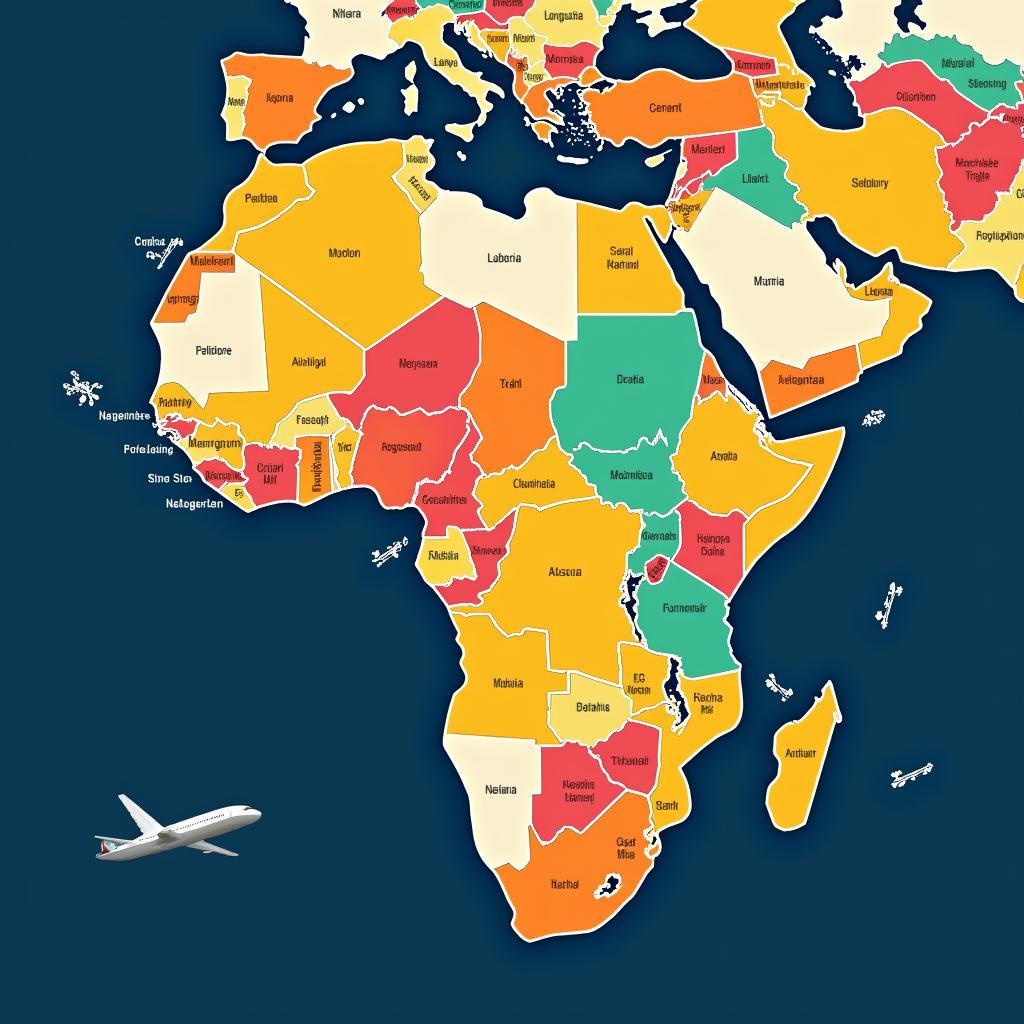The African Continental Free Trade Area: A Game-Changer for Nigeria?
The African Continental Free Trade Area (AfCFTA) has been touted as a potential game-changer for Africa’s economies, and Nigeria, as Africa’s largest economy, is uniquely positioned to reap significant benefits. But what exactly does this trade agreement mean for Nigeria, and how will it impact the lives of everyday Nigerians?
Understanding the AfCFTA and its Implications for Nigeria
The AfCFTA aims to create a single market for goods and services across the African continent, encompassing 1.3 billion people and a combined GDP of over $3.4 trillion. By eliminating tariffs and other trade barriers, the agreement aims to boost intra-African trade, attract foreign investment, and stimulate economic growth.
 Nigeria Trade Map
Nigeria Trade Map
For Nigeria, a country heavily reliant on oil exports and facing challenges of unemployment and poverty, the AfCFTA presents a unique opportunity to diversify its economy, create jobs, and improve the livelihoods of its citizens.
Potential Benefits for Nigeria: From Trade to Transformation
Increased Trade and Economic Growth: The most immediate impact of the AfCFTA on Nigeria is the potential for increased trade. By reducing tariffs, Nigerian businesses will have access to a much larger market, allowing them to expand their reach and boost exports. This increased trade is expected to result in significant economic growth, creating jobs and generating revenue for the government.
Industrialization and Value Addition: Beyond simply trading raw materials, the AfCFTA encourages African countries to move up the value chain. For Nigeria, this means a chance to develop its manufacturing sector, process its raw materials, and produce higher-value goods, leading to greater economic diversification and competitiveness.
Job Creation and Poverty Reduction: As trade increases and new industries develop, the demand for skilled labor will rise, creating much-needed jobs for Nigeria’s young and growing population. This, in turn, has the potential to lift millions out of poverty and contribute to greater economic inclusion.
“The AfCFTA represents a real opportunity for Nigeria to shift from a resource-based economy to a more diversified and industrialized one,” says Dr. Obiageli Ezekwesili, former Vice President of the World Bank and a leading voice on African economic development. “This will not only boost economic growth but also create jobs and improve the lives of millions of Nigerians.”
Addressing the Challenges: Infrastructure, Implementation, and Competition
While the potential benefits of the AfCFTA are significant, Nigeria also faces challenges in fully leveraging this opportunity.
Infrastructure Development: Inadequate infrastructure, particularly in transportation and energy, remains a major obstacle to trade in Africa. Nigeria will need to invest heavily in upgrading its infrastructure to facilitate smoother movement of goods and services across borders.
Implementation and Enforcement: Effective implementation of the AfCFTA’s provisions and ensuring compliance from all member states will be crucial for its success. Streamlining customs procedures, harmonizing regulations, and addressing non-tariff barriers will be essential.
Competition and Competitiveness: While the AfCFTA creates opportunities, it also brings increased competition. Nigerian businesses will need to improve their competitiveness by enhancing productivity, embracing innovation, and producing high-quality goods to thrive in this expanded market.
Seizing the Moment: Nigeria’s Path to Success in the AfCFTA Era
To fully realize the benefits of the AfCFTA, Nigeria needs to adopt a proactive and strategic approach.
- Investing in Infrastructure: Prioritizing investments in transportation, energy, and digital infrastructure is vital for facilitating trade and reducing the cost of doing business.
- Supporting the Private Sector: Providing incentives for businesses to engage in intra-African trade, such as access to finance, capacity building programs, and market information, will be crucial.
- Addressing Non-Tariff Barriers: Working with other African countries to eliminate non-tariff barriers, such as cumbersome customs procedures and bureaucratic delays, will be essential for seamless trade.
 African Business Leaders Discussing Trade
African Business Leaders Discussing Trade
The AfCFTA is not a magic bullet, but it presents a transformative opportunity for Nigeria. By addressing the challenges and embracing a collaborative and strategic approach, Nigeria can leverage this historic agreement to drive economic growth, create jobs, and improve the lives of its citizens.
FAQ
1. How will the AfCFTA impact prices of goods in Nigeria?
The AfCFTA aims to reduce tariffs, which could lead to lower prices for some imported goods from other African countries. However, other factors like transportation costs and domestic production capacity also play a role in determining prices.
2. What are the key sectors in Nigeria that will benefit from the AfCFTA?
Agriculture, manufacturing, and services are expected to see significant growth opportunities due to increased market access and demand.
3. How will the AfCFTA affect unemployment in Nigeria?
The agreement is expected to create jobs, particularly in sectors experiencing growth due to increased trade. However, it’s important to note that job creation also depends on factors like skills development and investment.
4. What is Nigeria doing to prepare for the challenges of increased competition?
The government is implementing policies to support businesses, improve competitiveness, and attract investments. There’s also a focus on skills development to equip Nigerians for the evolving job market.
5. What is the role of the Nigerian government in ensuring the success of the AfCFTA?
The government plays a crucial role in creating a conducive environment for businesses, investing in infrastructure, and promoting regional integration efforts.
Need more information?
For more insights into the African economy and the impact of the AfCFTA, explore these related articles:
- African Currency Market
- African Country List by GDP
- African Countries Exports and Imports
- African Countries and Capitals and Currency in English
- How Many Countries Are There in African Union
Get in touch with our team for personalized support. Contact us at:
Phone: +255768904061
Email: [email protected]
Address: Mbarali DC Mawindi, Kangaga, Tanzania
Our dedicated customer service team is available 24/7 to assist you.
